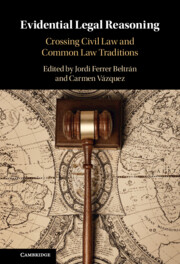Book contents
- Evidential Legal Reasoning
- Evidential Legal Reasoning
- Copyright page
- Contents
- Figures
- Tables
- Contributors
- Introduction
- Part I Evidence As an Area of Knowledge
- Part II Convergences between Systems
- Part III On Evidential Inferences
- Part IV Expert Evidence
- 12 From Institutional to Epistemic Authority: Rethinking Court-Appointed Experts
- 13 Latent Justice
- 14 Prevention and Education
- 15 Evidentiary Practices and Risks of Wrongful Conviction
- Part V Standards of Evidence As Decision-Making Rules
- Index
- References
12 - From Institutional to Epistemic Authority: Rethinking Court-Appointed Experts
from Part IV - Expert Evidence
Published online by Cambridge University Press: 05 May 2022
- Evidential Legal Reasoning
- Evidential Legal Reasoning
- Copyright page
- Contents
- Figures
- Tables
- Contributors
- Introduction
- Part I Evidence As an Area of Knowledge
- Part II Convergences between Systems
- Part III On Evidential Inferences
- Part IV Expert Evidence
- 12 From Institutional to Epistemic Authority: Rethinking Court-Appointed Experts
- 13 Latent Justice
- 14 Prevention and Education
- 15 Evidentiary Practices and Risks of Wrongful Conviction
- Part V Standards of Evidence As Decision-Making Rules
- Index
- References
Summary
Beyond any theoretical suppositions or assumptions regarding the greater reliability of court-appointed experts as opposed to expert witnesses, very few analyses have been conducted to test the hypothesis in current legal systems. And this is precisely the objective of this work: taking the current Spanish procedural system as my example, I will set out to question not only the necessary epistemic superiority of court-appointed expert opinions, but also the fact that the mere origin of the expert opinion is a relevant factor that should be considered. As we shall see, the selection, prepping and remuneration of the expert could be regulated in such a way that they do not even guarantee the impartiality of the court-appointed expert; however, in order to assess the reliability of an expert opinion we would have to evaluate what the expert did and asserted in the specific case, and this is independent of their origin.
- Type
- Chapter
- Information
- Evidential Legal ReasoningCrossing Civil Law and Common Law Traditions, pp. 217 - 247Publisher: Cambridge University PressPrint publication year: 2022

